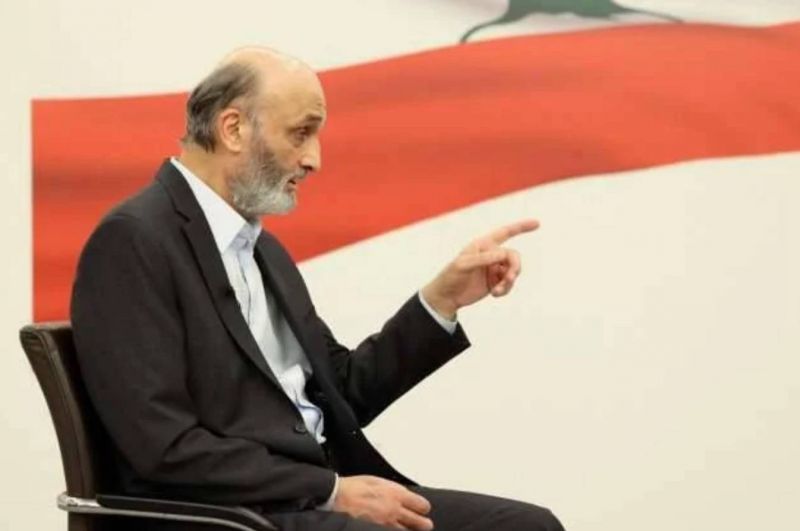
Lebanese Forces leader Samir Geagea during an interview in May 2022. (Credit: Joseph Eid/AFP)
Lebanese Forces (LF) leader Samir Geagea has been taking every opportunity to criticize the caretaker government’s decision to compensate residents of southern Lebanon affected by Israeli bombardments since Hezbollah joined the ongoing war between Israel and Hamas on Oct. 8.
Geagea insisted that it was Hezbollah’s responsibility to compensate local residents at its own expense and that the state cannot account for the party’s “mistakes.”
However, Geagea’s statements appear to conflict with the opposition stance, of which LF is the largest component. The camp has repeatedly called upon the resigning government to meet the needs of the Lebanese amid the dire conditions, in a bid to curb Hezbollah’s clientelist network.
‘Hezbollah must compensate them’
“For us, it would be unacceptable that at a time when the country is going through a difficult economic crisis, public money should be spent on cleaning up after Hezbollah,” said LF spokesperson Charles Jabbour. “If we can’t prevent the group from appropriating sovereign decisions such as war and peace, we won’t allow it to turn the Lebanese state into an NGO,” Jabbour continued.
“It has to know that its actions will have consequences.”
Pending a study assessing the extent of the damage, the government has estimated compensation at some $10 million.
While the LF is opposed to the state reimbursing this sum, it insists that the affected people must be compensated.
“Hezbollah must compensate them, not only for the homes destroyed and damaged but also for the short- and long-term economic damage,” Jabbour said.
Lebanon’s involvement in the Gaza war appears to have had a major impact on the tourism sector, which was booming before the outbreak of the conflict.
The Israeli army used white phosphorus to set fire to vast agricultural fields and olive groves in the border area.
Whether driven by a concern to spare the Treasury from excessive expenses or a desire to prevent the March 8-affiliated (close to Hezbollah) government from garnering popular sympathy, the LF’s position lacks unanimous support within the opposition.
Some opponents argue that it is the state’s responsibility to compensate its citizens.
This perspective aims to avoid reinforcing the clientelist dynamics that empower Hezbollah, bolstered by Iran’s substantial financial backing, and further enhance its popularity.
In September 2021, following a deadly fuel tank explosion in Tleil, a village in predominately Sunni Akkar, Hezbollah provided significant financial assistance to the families of the victims.
L’Orient-Le Jour learned that Hezbollah delegations visited heads of municipalities in the border towns affected by the fighting, assuring them the party would take charge of rebuilding damaged property.
Last week, Hezbollah MP Hussein Fadlallah announced the first compensation payments had already been made.
An alternative to Hezbollah
“If the government does not take any action, the idea that Hezbollah is responsible for the protection and management of the South will be further reinforced,” said opposition MP Halimé Kaakour.
Hezbollah’s narrative in this regard is that the Shiite population in the South and the Bekaa have been historically neglected by successive governments.
“But people are not fools,” Jabbour said. “They are well aware that by compensating them, the party isn’t doing them any favors.”
“It’s the least it can do after causing such destruction,” he added.
However, according to Kaakour, “allowing Iran to compensate our fellow citizens through Hezbollah is not the way to establish a robust state with a monopoly on arms, especially in the face of the Israeli enemy.”
This is not the first instance where the issue of compensation following Israeli bombardment has sparked controversy.
In August 2006, after a month of war between Hezbollah and Israel, the party promptly offered compensation to affected residents in various Lebanese regions.
“This drew severe criticism from Western countries involved in Lebanon,” a former minister told L’Orient-Le Jour on condition of anonymity due to the sensitivity of the issue. “They did not want to allow the pro-Iranian party to enhance its popularity post-war and would have preferred the state to lead the reconstruction efforts, presenting itself as a credible alternative to Hezbollah’s social infrastructure.”
This article was originally published in French in L'Orient-Le Jour. Translation by Sahar Ghoussoub.